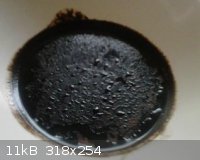Daddy
Harmless

Posts: 26
Registered: 13-3-2009
Location: Peru
Member Is Offline
Mood: No Mood
|
|
Citric acid "burnt" at 70ºC?
My kids and I have begun again to do some chemical experiments, after having put it on the shelf for some years. So I decided to visit again this
forum with our latest accidental discovery.
We tried to extract citric acid from lemon juice - only at test tube scale to begin. First we filtered the juice, then we added lime, decanted and
rinsed, then added 40% H2SO4 to the residue. Since we saw no visible sign of a reaction, we boiled it gently for ten minutes.
(First question here: is heating - or a stronger concentration of the acid - actually needed, or does this reaction occur spontaneously? I had
expected to observe at least a color change in the calcium compound, since gypsum (CaSO4) is normally white; but it remained grey.)
Well, after that we added some more water, decanted and left the liquid on a dish in our solar evaporator - a simple glass-covered black plywood box
with a black metal tray inside. After some hours it took the consistence of a thick, yellowish, half-crystallized syrup.
Then the unforeseen happened. I had to go for an errand and left the evaporator unattended. I delayed longer than I thought. When I came back after
three hours, the substance on the dish was dry (although still somewhat sticky) - and it had turned dark brown, almost black! (Most of the dark color
seems to be elemental carbon.) - One day later (having it taken out of the evaporator), liquid droplets had appeared on its surface (see photo).

Now, the temperature in the evaporator box is normally around 60 to 70ºC - far below the 175º at which citric acid is supposed to decompose. May
some residual H2SO4 have caused this "burning" effect (similar to what it does to sugar)? Or is citric acid sensitive to strong sunlight?
If the first case applies, how can I know or make sure that the second reaction (H2SO4 with calcium citrate) goes to completion? - We had used some
20-25% excess of lime over the stoichiometric amount in respect to H2SO4 (and in respect to the expected amount of citric acid in the juice), so there
should (theoretically) no H2SO4 be left.
|
|
|
Ozone
International Hazard
    
Posts: 1269
Registered: 28-7-2005
Location: Good Olde USA
Member Is Offline
Mood: Integrated
|
|
I looks like the sulfuric acid concentrated upon drying and dehydrated your sample (leaving mostly carbon). It's similar to mixing concentrated acid
with sucrose. When liberating free acid, I like to use a volatile acid like HCl (we recover aconitic acid from cane molasses). You can also try the
mixed Mg/Ca salt.
I had a student burn up aconitic acid exactly the same way.
Cheers,
O3
[Edited on 9-2-2012 by Ozone]
-Anyone who never made a mistake never tried anything new.
--Albert Einstein
|
|
|
aaparatuss
Harmless

Posts: 41
Registered: 12-7-2011
Location: indepth
Member Is Offline
Mood: questing
|
|
what did you want the H2SO4 to accomplish...
try wiki, The juice as treated with lime (CaO) to precipitate calcium citrate, which was isolated and converted back to the acid.[5]
base is better here, i would think the solution to turn milky white which Calcium salts do, then filter... I combined both Calcium Hypochlorite and
Oxalic acid for a serious wood bleaching effort, but produced a milky brew
dont get me wrong playing with acids is fun
|
|
|
Daddy
Harmless

Posts: 26
Registered: 13-3-2009
Location: Peru
Member Is Offline
Mood: No Mood
|
|
Yes, aaparatuss, that is exactly the purpose of the H2SO4 - converting calcium citrate back to citric acid (and CaSO4 as a precipitate).
A base is better here?? I don't think so: if you had Ca(OH)2 and citric acid, then they would again neutralize each other and form calcium citrate.
To Ozone: So I was correct in my suspicion that some leftover H2SO4 was the culprit... How would you isolate the citric acid with HCl? CaCl2 is water
soluble, so I would have a mix of CaCl2 and citric acid in the solution, wouldn't I?
All the sources I found indicate that using H2SO4 is the standard process. But how can I make sure that this second reaction (H2SO4 and calcium
citrate) goes to completion, so that no H2SO4 remains?
|
|
|
Daddy
Harmless

Posts: 26
Registered: 13-3-2009
Location: Peru
Member Is Offline
Mood: No Mood
|
|
... a second thought: Or do you mean adding some NaCl so that would form HCl together with the remaining H2SO4? Would that be a meaningful way to
eliminate leftover H2SO4?
|
|
|
Daddy
Harmless

Posts: 26
Registered: 13-3-2009
Location: Peru
Member Is Offline
Mood: No Mood
|
|
Well, I finally found this reference in another thread here:
http://www.erowid.org/archive/rhodium/chemistry/citricacid.t...
This article mentions specifically the risk of carbonizing the extracted acid during the last step, so it seems that the problem of residual H2SO4
cannot be avoided and the crystallization must be done more carefully. Also it says that the H2SO4 must be much more diluted, and several other hints.
I hope to have time some day to try it again, taking into account these points.
|
|
|